

Watch The African Americans: Many Rivers to Cross Online. 2-The Century_ America's Time - 1920-1929 Boom to Bust. Watch The African Americans: Many Rivers to Cross Online. Harlem Renaissance Resources (Virtual Programs & Services, Library of Congress) Compiled by Angela McMillian, Digital Reference Specialist African-American expressions of writing, music, and art during the 1920s and 1930s are well represented in the vast collections of the Library of Congress.
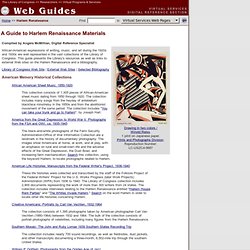
This guide presents the Library's resources as well as links to external Web sites on the Harlem Renaissance and a bibliography. Library of Congress Web Site | External Web Sites | Selected Bibliography African American Sheet Music, 1850-1920 America from the Great Depression to World War II: Photographs from the FSA and OWI, ca. 1935-1945 The black-and-white photographs of the Farm Security Administration-Office of War Information Collection are a landmark in the history of documentary photography. American Life Histories: Manuscripts from the Federal Writer's Project, 1936-1940 Creative Americans: Portraits by Carl Van Vechten, 1932-1964 The collection consists of 1,395 photographs taken by American photographer Carl Van Vechten (1880-1964) between 1932 and 1964. William P. The American Novel . Literary Timeline . Novels . THE GREAT GATSBY. THE GREAT GATSBY is a lyrical portrait of American values in the 1920s, the personal and moral corruption of a culture based on the social and moral prerogatives of wealth.
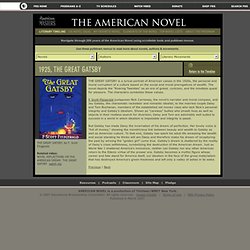
The novel depicts the "Roaring Twenties" as an era of greed, cynicism, and the mindless quest for pleasure. The characters symbolize these values. F. Scott Fitzgerald juxtaposes Nick Carraway, the novel's narrator and moral compass, and Jay Gatsby, the charismatic racketeer and romantic idealist; to the married couple Daisy and Tom Buchanan, members of the established old money class who lack Nick's personal integrity and Gatsby's idealism. Shown as "careless" bullies who smash lives as well as objects in their restless search for diversion, Daisy and Tom are admirably well suited to succeed in a world in which idealism is impossible and integrity is passé. The American Novel . Video. MATTHEW BRUCCOLI: Anything and everything seemed possible in the 1920's.
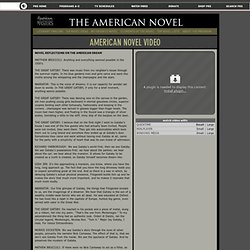
THE GREAT GATSBY: There was music from my neighbor's house through the summer nights. In his blue gardens men and girls came and went like moths among the whispering and the champagne and the stars. NARRATOR: This is the voice of dreams; it is our capacity for wonder set down to words. The Serious Superficiality of The Great Gatsby. Baz Luhrmann’s “The Great Gatsby” is lurid, shallow, glamorous, trashy, tasteless, seductive, sentimental, aloof, and artificial.
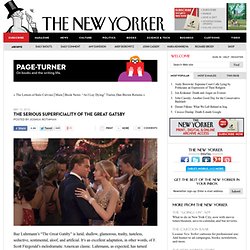
It’s an excellent adaptation, in other words, of F. Scott Fitzgerald’s melodramatic American classic. Luhrmann, as expected, has turned “Gatsby” into a theme-park ride. But he’s done it in exactly the right way. He hasn’t tried to make the novel more respectable, intellectual, or realistic. “Gatsby” is hard to pin down. A lot of the confusion stems from the fact that “Gatsby” isn’t like other great American books. What’s most appealing about “Gatsby” might be its mood of witty hopelessness, of vivacious self-destructiveness. Fitzgerald understood the pleasures of giving in, and he saw people as desperate to give in to nearly anything—a drink, a person, a story, a feeling, a song, a crowd, an idea.
In “The Great Gatsby,” there are a few large ideas, a few common dreams, to which everybody is attracted. But “Gatsby” isn’t really a novel about love. How Much Would It Cost to Be the Great Gatsby? The highly anticipated movie from Moulin Rouge director Baz Luhrmann, The Great Gatsby, opens this weekend.
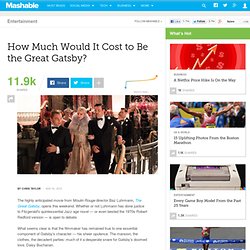
Whether or not Luhrmann has done justice to Fitzgerald's quintessential Jazz age novel — or even bested the 1970s Robert Redford version — is open to debate. What seems clear is that the filmmaker has remained true to one essential component of Gatsby's character — his sheer opulence. Was the Great Gatsby Broke? Show a little restraint, man!
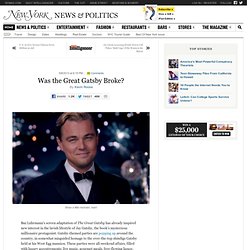
Baz Luhrmann's screen adaptation of The Great Gatsby has already inspired new interest in the lavish lifestyle of Jay Gatsby, the book's mysterious millionaire protagonist. Gatsby-themed parties are popping up around the country, in somewhat misguided homage to the over-the-top shindigs Gatsby held at his West Egg mansion. These parties were all-weekend affairs, filled with luxury accoutrements: live music, gourmet meals, free-flowing liquor. Nothing, it seemed, was too expensive for Jay Gatsby. Or was it? First Listen: Music From Baz Luhrmann's Film 'The Great Gatsby' Hide captionThe soundtrack to Baz Luhrmann's film The Great Gatsby, starring Leonardo DiCaprio, comes out May 7.
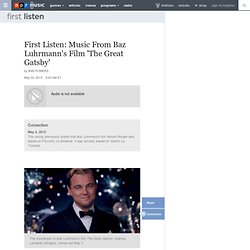
Courtesy of Warner Bros. Pictures The soundtrack to Baz Luhrmann's film The Great Gatsby, starring Leonardo DiCaprio, comes out May 7. Audio for this feature is no longer available. One of the many trailers promoting Baz Lurhmann's film version of The Great Gatsby ends with Leo DiCaprio uttering a crucial line adapted from the original novel. How did the music in the original Great Gatsby feel to its characters and audience? But that's not Lurhmann's way. Whether Lurhmann's film does justice to Fitzgerald's essential work will become widely evident when the film opens on May 10. On that level, the album succeeds. He only glancingly compares himeself Jay Gatsby. Perhaps a certain sense of privilege leads the album's rockers to identify most closely with Jay Gatsby and his friends or enemies.
Is this a problem? Teaching 'The Great Gatsby' With The New York Times. Update |June, 2013 In 2002, writing just seven months after the Sept. 11 attacks, Adam Cohen noted on the opinion page that the story of Jay Gatsby – the “cynical idealist, who embodies America in all its messy glory” – was more relevant than ever: In today’s increasingly disturbing world, home to Al Qaeda cells and suicide bombers, offshore sham partnerships and document-shredding auditors, the grim backdrop against which Gatsby’s life plays out feels depressingly right.
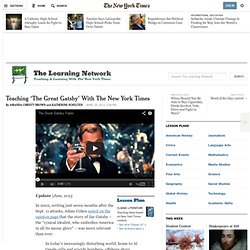
Beautiful Little Fools: New Yorker Ads from the 'Great Gatsby' Era. Before F.
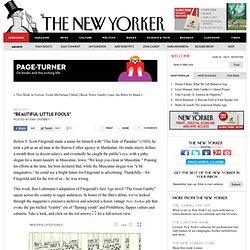
Scott Fitzgerald made a name for himself with “This Side of Paradise” (1920), he took a job as an ad man at the Barron Collier agency in Manhattan. He made ninety dollars a month there (a decent salary), and eventually he caught the public’s eye, with a pithy slogan for a steam laundry in Muscatine, Iowa: “We keep you clean in Muscatine.”
Praising his efforts at the time, his boss declared that, while the Muscatine slogan was “a bit imaginative,” he could see a bright future for Fitzgerald in advertising. Thankfully—for Fitzgerald and for the rest of us—he was wrong.